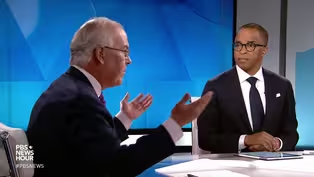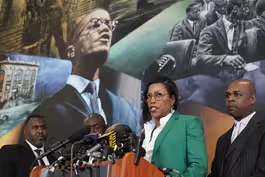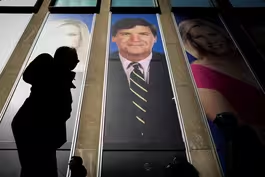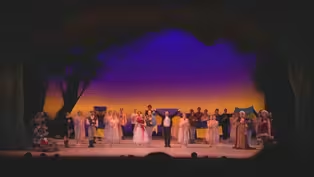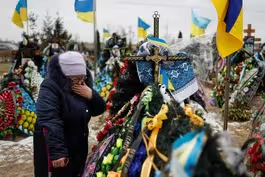
Earthquake recovery hampered by sheer scale of destruction
Clip: 2/24/2023 | 5m 31sVideo has Closed Captions
Earthquake recovery hampered by sheer scale of destruction in Turkey and Syria
In the two weeks since deadly earthquakes hit southern Turkey and northern Syria, the focus has shifted from rescue to rehabilitation. The task ahead is not only to reconstruct homes, but also to rebuild lives, especially for the youngest victims. Special correspondent Jane Ferguson reports.
Problems playing video? | Closed Captioning Feedback
Problems playing video? | Closed Captioning Feedback
Major corporate funding for the PBS News Hour is provided by BDO, BNSF, Consumer Cellular, American Cruise Lines, and Raymond James. Funding for the PBS NewsHour Weekend is provided by...

Earthquake recovery hampered by sheer scale of destruction
Clip: 2/24/2023 | 5m 31sVideo has Closed Captions
In the two weeks since deadly earthquakes hit southern Turkey and northern Syria, the focus has shifted from rescue to rehabilitation. The task ahead is not only to reconstruct homes, but also to rebuild lives, especially for the youngest victims. Special correspondent Jane Ferguson reports.
Problems playing video? | Closed Captioning Feedback
How to Watch PBS News Hour
PBS News Hour is available to stream on pbs.org and the free PBS App, available on iPhone, Apple TV, Android TV, Android smartphones, Amazon Fire TV, Amazon Fire Tablet, Roku, Samsung Smart TV, and Vizio.
Providing Support for PBS.org
Learn Moreabout PBS online sponsorshipAMNA NAWAZ: In the nearly three weeks since deadly quakes hit Southern Turkey and Northern Syria, the focus has shifted from rescue to rehabilitation.
The task ahead is not only to reconstruct homes, but also to rebuild lives, especially for the youngest victims.
Special correspondent Jane Ferguson reports.
JANE FERGUSON: In the tent city of Gaziantep, life after the earthquakes is all but an endless struggle.
Hatice Demir is battling cancer and now homelessness.
Learning to live with the bare minimum.
HATICE DEMIR, Turkish Earthquake Survivor (through translator): I used to wake up in a warm room, but now I'm chasing gas stations, running around looking for a sink to wash up.
Our opportunities are gone.
Our self-confidence is gone.
JANE FERGUSON: Like her, a million Turks are now without a home.
Hundreds here stood in line in the cold for a shower.
The public swimming pool has been turned into a sanitation center.
Efforts to find the living under the rubble have ended, now a focus on the next stage, rebuilding.
Yasir Behrakci is picking up the pieces of his life.
YASIR BEHRAKCI, Turkish Earthquake Survivor (through translator): We cannot bring back the dead.
But, because we survived, we are trying to get out whatever is left.
We have to live.
We have no other choice.
TOM SMITH, Project HOPE: Luckily, that mind shift and work is getting started.
We are in Adiyaman, which, as you know, is 60 percent, 70 percent destroyed.
They are already clearing large plots of land to put containers on.
JANE FERGUSON: Tom Smith is an American air force veteran, volunteering in Turkey with Washington, D.C., based charity project hope.
TOM SMITH: The challenge is there.
When you talk about just rebuilding, it is not just, hey, here is the house that we are going to rebuild.
It is going to be, what is that intermediary step, which is basic housing units.
JANE FERGUSON: Smith and his team have been assessing the needs of those displaced by the earthquake.
TOM SMITH: The need for sanitation.
Everyone -- everyone loves that hot shower, the ability to wash their hands, go to a safe latrine and safe drinking water.
It is still cold here.
It's 20 degrees at night, 40 degrees during the day.
And people are living in tents.
JANE FERGUSON: And yet attempts to move on have been disrupted again by the heaving earth.
On Monday, another large quake in Antakya terrified already traumatized displaced families.
RAWAN HAMADEH, Project HOPE: This is what we call complex trauma, because, OK, the incident happened the first time, but now it is reoccurring.
We are -- we're currently experiencing aftershocks, and the people are -- continuously going through the trauma again and again.
JANE FERGUSON: Rawan Hamadeh is also with Project HOPE and provides psychological support to earthquake victims and rescue staff.
She says the last few weeks have been especially tough on the youngest here.
RAWAN HAMADEH: We hear stories about children going mute after the earthquake and not being able to talk or to express themselves in any way.
We are seeing, like, bed-wetting issues, of course, disturbances in sleep and eating patterns.
We are seeing children who are extremely attached to their mother.
They wouldn't leave their side or extreme isolation from others.
JANE FERGUSON: Volunteers are trying to bring joy back to their lives, an effort to let children be children.
Infants across the border in Northwest Syria are also in desperate need.
This clinic in the quake-hit Jindires is overrun with patients, but running out of medicines.
A U.N. delegation finally arrived here, over two weeks since the earthquakes.
DAVID ANTHONY CARDEN, United Nations: I'm shocked by the scale of the disaster.
I have never seen anything like it.
People need food.
They need shelter.
They need fresh water.
They need sanitation.
So, the needs are huge.
JANE FERGUSON: A day after the first wave of quakes, this family survived against all odds.
Mostafa El Sayed, his wife and three children were some of the few to make it out alive from Haram city, where 800 people died.
At that time, this moment of his little dollar's Elaf's rescue was a rare glimmer of hope in a battered Syria.
The "NewsHour" caught up with them two weeks later.
ZUHAIR EL SAYED, Syrian Earthquake Survivor (through translator): I'm 5 right now, right?
Five levels fell on top of us.
We were calling out: "Civil defense, please help us.
We are going to die."
There was a man who heard us.
They said they are going to rescue us in the morning.
I was like, whoa.
I was sleeping, sleeping, sleeping, and then I knew they were coming to take us out.
ELAF EL SAYED, Syrian Earthquake Survivor (through translator): We were sleeping, and there was a small earthquake.
And then there was another one.
And the rocks fell on top of us.
There was dirt in my ear.
And then the civil defense came, and they rescued us,and they took us to the hospital, and then they took us to grandpa's house.
JANE FERGUSON: Elaf and thousands of Syrian and Turkish kids like her have escaped with their lives.
The quality of those lives now depends on an unprecedented, massive operation to repair and rebuild.
For the "PBS NewsHour," I'm Jane Ferguson.
Brooks and Capehart on Fox's access to Jan. 6 video
Video has Closed Captions
Clip: 2/24/2023 | 11m 28s | Brooks and Capehart on Tucker Carlson's access to Jan. 6 video, war in Ukraine (11m 28s)
Lawsuit may provide answers about Malcolm X's assassination
Video has Closed Captions
Clip: 2/24/2023 | 3m 49s | New lawsuit may help provide answers about Malcolm X's assassination (3m 49s)
McCarthy criticized for giving Carlson Jan. 6 videos
Video has Closed Captions
Clip: 2/24/2023 | 3m 45s | McCarthy drawing criticism for giving Carlson exclusive access to video of Jan. 6 attack (3m 45s)
Ukrainian ballet dancers serve as cultural ambassadors
Video has Closed Captions
Clip: 2/24/2023 | 7m 57s | Ukrainian ballet dancers in exile serve as cultural ambassadors as war rages on at home (7m 57s)
Zelenskyy delivers call for Ukrainians to stay resilient
Video has Closed Captions
Clip: 2/24/2023 | 14m 54s | Zelenskyy delivers call for Ukrainians to stay resilient a year into Russia's invasion (14m 54s)
Providing Support for PBS.org
Learn Moreabout PBS online sponsorship
- News and Public Affairs

FRONTLINE is investigative journalism that questions, explains and changes our world.

- News and Public Affairs

BREAKING the DEADLOCK sparks bold, civil debate on America’s toughest issues.












Support for PBS provided by:
Major corporate funding for the PBS News Hour is provided by BDO, BNSF, Consumer Cellular, American Cruise Lines, and Raymond James. Funding for the PBS NewsHour Weekend is provided by...
